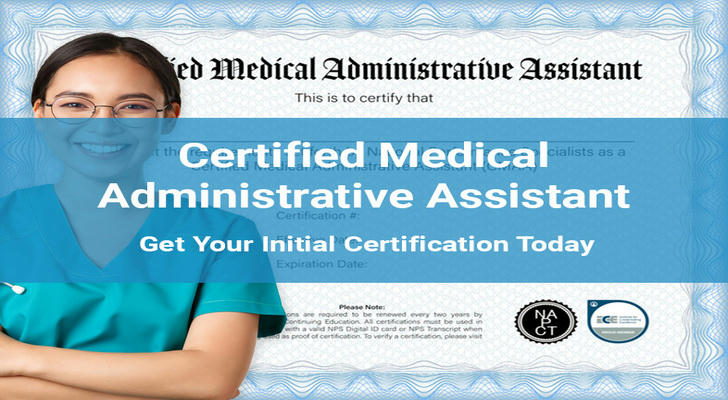The Certified Medical Administrative Assistant (CMAA): Elevating Excellence in Healthcare Administration
The Certified Medical Administrative Assistant (CMAA) credential is a hallmark of proficiency in healthcare administration, recognized globally for its emphasis on operational efficiency, compliance, and patient-centered service delivery. As healthcare systems increasingly prioritize streamlined workflows and regulatory adherence, CMAA-certified professionals bridge the gap between clinical operations and administrative excellence. This certification equips candidates with the expertise to manage complex healthcare environments, from electronic health records (EHR) to financial data governance, ensuring alignment with evolving industry standards.

Core Competencies and Skill Development
The CMAA curriculum is designed to cultivate expertise across three critical domains:
1. Technical Proficiency in Healthcare Systems
EHR and ERP Mastery: Training focuses on platforms like SAP's healthcare modules (MM for procurement and FI for financial management) and CDEM systems for reimbursement processing. Candidates learn to maintain 99.8% data accuracy, a benchmark critical for audit compliance.
Advanced Data Analytics: Proficiency in Excel is emphasized, including dynamic dashboard creation for expense analysis and predictive modeling using tools like Power BI.
2. Regulatory Compliance and Risk Management
Legal Frameworks: Courses cover HIPAA regulations, JCAHO accreditation standards, and OSHA safety protocols. Scenarios such as PHI (Protected Health Information) breaches train candidates in crisis response.
Audit Preparedness: Modules on documentation integrity and audit trail management ensure adherence to 48-hour data update mandates in systems like SAP.
3. Leadership and Operational Strategy
Team Coordination: CMAA holders lead cross-departmental teams, applying agile methodologies to optimize workflows (e.g., reducing procurement cycle times by 12% through lean management).
Crisis Mitigation: Training includes designing contingency plans for system outages and managing interdepartmental conflicts during high-pressure scenarios.

Certification Pathway: Rigor and Accessibility
Earning the CMAA credential involves a structured, competency-based process:
Educational Prerequisites:
- A minimum of an associate degree (AA) in healthcare administration or a related field is required. Alternatively, candidates with a high school diploma and 2-3 years of administrative experience may qualify.
- Recommended pre-certification courses include HIPAA compliance training (8 annual CE hours) and SAP TERP10 certification (120 online hours).
Examination Components:
- A two-part exam assesses theoretical knowledge and applied skills. Part 1 tests EHR navigation and regulatory knowledge (60 multiple-choice questions), while Part 2 evaluates crisis management and financial data analysis through scenario-based simulations.
- Passing thresholds require a minimum score of 75%, with emphasis on real-world application over rote memorization.
Professional Experience:
- Candidates must complete a 6-month practicum in a healthcare setting, validated by a supervising CMAA-certified professional.
Career Opportunities and Industry Recognition
CMAA certification unlocks diverse roles across healthcare ecosystems:
Hospital Administration: Positions include departmental coordinators, patient services managers, and compliance officers. Major institutions like the Kentucky University Healthcare System prioritize CMAA holders for leadership roles due to their dual expertise in finance and operations.
Health Technology Firms: Graduates contribute to ERP implementation projects, optimizing platforms like Epic or Cerner for clinical workflows.
Consulting and Advocacy: CMAA-certified professionals advise healthcare startups on regulatory strategy or lead community health initiatives, such as improving access to telemedicine in underserved areas.
The credential is endorsed by organizations like the Healthcare Financial Management Association (HFMA) and aligns with global trends in healthcare digitization, including robotic process automation (RPA) adoption.

Continuing Education and Specializations
CMAA certification mandates 20 hours of annual continuing education, focusing on emerging trends:
Digital Transformation: Courses on AI-driven scheduling tools and blockchain for health data security.
Advanced Certifications: Professionals often pursue credentials like FACHE (Fellow of the American College of Healthcare Executives) or PMCC (Project Management Core Certification) to specialize in areas like healthcare IT or disaster recovery planning.
Ethical Stewardship in Healthcare
CMAA training emphasizes ethical decision-making:
Patient Advocacy: Adhering to transparency in billing practices and minimizing conflicts of interest during vendor negotiations.
Community Impact: Initiatives include organizing financial literacy workshops for low-income patients and volunteering in crisis response teams during public health emergencies.
Conclusion
The CMAA certification transcends administrative skill-building—it fosters leaders capable of navigating the complexities of modern healthcare. By integrating technical mastery with ethical rigor, CMAA professionals drive operational excellence while upholding patient trust. As healthcare continues its shift toward value-based care and digital innovation, CMAA-certified administrators will remain indispensable in shaping resilient, efficient, and equitable healthcare systems.
References:
- Healthcare Administrative Competencies (Job Posting Analysis, 2025)
- CMAA Certification Requirements (Industry Training Guidelines, 2025)
- Career Pathways for CMAA Holders (Healthcare Management Report, 2025)
